#elexus jionde
Text
A Black History of Stripper Culture👠💵
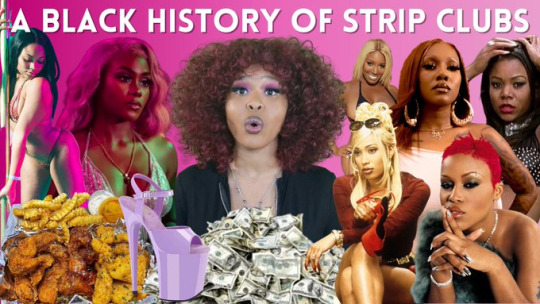
My exploration of sex history continues with A Black History of Stripper Culture. We talk about historic clubs like Magic City, how Atlanta got fully nude clubs, the black women who were/are strippers, the problems they face, labor history, depictions of black strippers, and how people's attitudes towards them have evolved over time.
youtube
#lexual#lexual media#elexusjionde#elexus jionde#90s#90s nostalgia#90s aesthetic#lexual does the 90s#black culture#black history#strip club#magic city#exotic dancer#black woman aesthetic#black woman appreciation#black woman beauty#black woman is god#black women#black women in luxury#black girl magic#black girl aesthetic#black girl beauty#black girl luxury#black girl moodboard#black beauty#p valley#Players Club#independence day#black fashion#intelexual media
72 notes
·
View notes
Text


@elexus.jionde
116 notes
·
View notes
Photo

#No but seriously the whole thing is evil#a trump rally#on juneteenth#In Tulsa Oklahoma the site of the black Wall Street massacre#We live in the pettiest version of hell#elexus jionde#lexual__#theperksofbeingblack
368 notes
·
View notes
Photo

#beloved#toni morrison#the underground railroad#colson whitehead#push#sapphire#the color purple#alice walker#angry black girl#elexus jionde#a slave play#Jeremy O. Harris#for colored girls who have considered suicide#Ntozake Shange#a raisin in the sun#Lorraine Hansberry#Fences#August Wilson#if beale street could talk#james baldwin#Are Prisons Obsolete#ANgela Davis#By Any Means Necessary#Malcolm X#I Have a Dream#Martin Luther King Jr.#Complete Poetry#Maya Angelou#The Stonewall Reader#new york public library
18 notes
·
View notes
Text
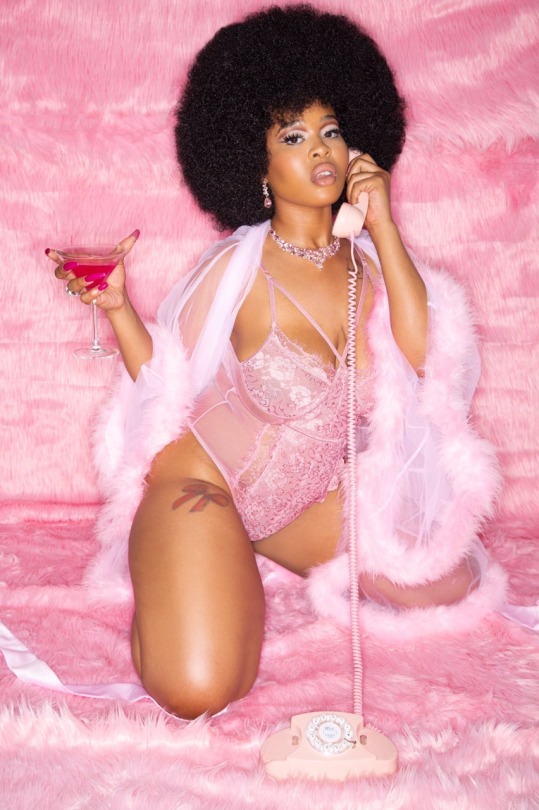
Elexus Jionde
73 notes
·
View notes
Photo




[1198360115897876480]
#@lexual__#lexual#elexus jionde#meek mill#robbers#rapists#abusers#black twitter#twitter#misogyny#birds of a feather
3 notes
·
View notes
Text
Slacktivism, Social Media, and Virtue-Signalling
Lockdown measures have forced people into their homes and onto the internet for community and companionship since the outbreak of COVID-19. Social media’s efficiency and easy operation make it the most attractive solution for this relatively new problem. As a result, social media platforms have become a more frequently visited aspect of more people’s lives (Molla, 2021). This recent spike in social media use coincided with various historical events: global Black Lives Matter protests, rising COVID-19 related deaths, and not one but two impeachments of former president Donald Trump. The internet served as what historian and writer Elexus Jionde refers to as a meeting place akin to Greek symposiums and French salons (2017). Users were free to discuss the chaos unfolding without violating COVID restrictions, as well as create and broaden activism networks. However, relying on social media for this kind of heavy lifting has not been without its repercussions. The widespread use and accessibility of social media platforms have transformed the internet into a hub for virtue signalling and policing other users’ posts, which have escalated with increased use during the pandemic.
Following the murder of George Floyd on May 25, 2020 by Minneapolis police, Instagram and Twitter were the initial avenues for outrage and protest during stay-at-home orders to limit the spread of COVID-19 (Ho, 2020). This digital activism resulted in the organization of #BlackoutTuesday, when 28 million Instagram users posted a plain black square to their feed in “support” of Black Lives Matter (Ho, 2020). Following #BlackoutTuesday, many users’ feeds returned to their regularly scheduled programming (Ho, 2020).
The fleeting support and concern for Black Lives Matter was enabled and publicized by the wide use of the app, indicated by the 28 million participants (Ho, 2020). Participation was also enabled by the ease of both using the platform and of the demonstration itself. In lieu of meaningfully engaging in activism, participants were simply called to post a black square. #BlackoutTuesday had the adverse effect of saturating hashtags like #BlackLivesMatter with meaningless black squares and overshadowing educative posts and resources for Black individuals, like donation links (Ho, 2020).
The botched gesture of #BlackoutTuesday can be explained by what Shannon Ho, platform editor for NBC News, calls “slacktivism”, which is low-effort activism exclusively on social media rather than in real life (2020). Ho explains that slacktivism counts as virtue signalling because it is motivated by wanting to construct a benevolent and politically aware persona through social media (2020). Virtue signalling and slacktivism are performative, as they are employed to replace rather than supplement the genuine effort necessary for authentic activism. The increasing number of people engaging in slacktivism can also sabotage legitimate methods of activism, as demonstrated by the misguided #BlackoutTuesday.
The flip side of virtue signalling on social media is moral policing and judgement of other people’s content. Rather than curating a certain image of oneself, users turned their critique outward at how other people portray themselves online. The incidence of this behaviour has drastically increased with the emergence of “COVID shaming” (Murphy, 2020). This is the understandable but ineffective trend of accosting individuals who appear to break COVID-19 rules and restrictions (Murphy, 2020). Online, this includes the attempt to dictate what another user could or should not post. This digital public shaming is common due to the speed of social media, allowing viewers to instantaneously view and pass judgement on others’ posts (Murphy, 2020). Social media’s widespread use has also ensured its access to a huge number of users, allowing more people to participate in “dog-piling” on rule-breakers (Murphy, 2020). COVID-shaming has motivated some users to refrain from posting to avoid scrutiny, or to caption their content assuring followers that they were “COVID safe” (Molla, 2021). This quick and very public shaming functions to police other people’s behaviour, whether it is the decision to post certain content or to do certain activities in real life for fear of being shamed online.
Individuals who choose to post Instagram selfies after receiving the COVID-19 vaccine also find themselves targeted by public shaming. Vaccination plans based on recipients’ eligibility determined by health risks have created a culture of distrust and envy (Choi, 2021). Users who target these vaccine selfies often question the deservingness of the poster to have received the highly sought dose before themselves (Choi, 2021). Such behaviour functions as moral policing as well as virtue signalling. Expressing mistrust of vaccine selfies causes recipients to feel guilty and to refrain from posting their selfies, while also creating the perception that the envious onlooker is an honest and responsible member of the public for asking such “hard-hitting” questions.
The effectiveness of both virtue signalling and moral policing on social media is explained by the accepted and increasingly expected habit of curating online profiles to maximize positive feedback. On Instagram, this feedback, in the form of likes and comments, conveys value to the recipient’s content (Ross, 2019). As such, content that depicts how benevolent an individual is, regardless of authenticity, is likely to receive more likes and/or comments. Public shaming that accompanies moral policing of content also achieves a similar result; users will select what to post based on what content is judged and policed by their social network. This manufacturing of one’s profile reflects media ideologies, described by cultural anthropologist Scott Ross as beliefs about how different media achieve certain communicative tasks (2019). Ross also describes how Instagram users create social rules that dictate their own as well as other people’s behaviour on the app (2019). The speed with which people can use social media, which Ross refers to as temporal accessibility, has allowed these rules to instantly yield feedback (2019). These social rules play a role in virtue signalling and moral policing. Virtue signalling achieves the task of communicating the moral goodness of a poster, while regulating other posters’ content achieves the goal of communicating “acceptable” online behaviour.
The social rules of Instagram and other platforms are frequently enforced and communicated through moral policing and virtue signalling to the degree that they are internalized. Following the envy and hostility generated by vaccine selfies, Instagram users felt guilty for having received the vaccine (Choi, 2021). Other users debated posting such content at all, or whether to caption their selfie with the reason for their vaccine eligibility in proactive defense of moral judgement (Choi, 2021). The internalization of this media ideology is widely reflected by social media users, who report self-regulating what they post to elude judgement and dogpiling (Molla, 2021).
The pervasive and efficient use of social media during an era of physical isolation has made it the primary venue for virtue signalling and moral policing. Interestingly, these new types of virtual dynamics and their consequences blur the boundaries between the internet and real life because of how real life informs social media and vice versa (Jionde, 2017). Anthropologists Yarimar Bonilla and Jonathan Rosa describe how Twitter, among other platforms, allows users to feel “united across space and time” despite being physically separated (2015). They also describe how the widespread use of the app allows for fruitful activism due to the aggregated effect of so many users championing a cause (Bonilla & Rosa, 2015). Despite the disingenuity behind virtue signalling and other social media behaviours, engaging in virtual activism has been found to lead to other forms of activism in real life, representing a material benefit of a fading boundary between the internet and real life (Ho, 2020). Taking the bad with the good is therefore just another way social media emulates real life.
References
Bonilla, Y., & Rosa, J. (2015). #Ferguson: Digital protest, hashtag ethnography, and the racial politics of social media in the United States. American Ethnologist,42(1), 4-17. doi:10.1111/amet.12112
Choi, Candice. "Guilt, Envy, Distrust: Vaccine Rollout Breeds Mixed Emotions." Thestar.com. March 08, 2021. Accessed March 10, 2021. https://www.thestar.com/life/2021/03/08/guilt-envy-distrust-vaccine-rollout-breeds-mixed-emotions.html.
Ho, Shannon. "A Social Media 'blackout' Enthralled Instagram. But Did It Do Anything?" NBCNews.com. June 13, 2020. Accessed March 9, 2021. https://www.nbcnews.com/tech/social-media/social-media-blackout-enthralled-instagram-did-it-do-anything-n1230181.
Jionde, E. (2017). Angry black girl. Lexington, Kentucky: Intelexual Media.
Molla, R. (2021, March 01). Posting less, posting more, and tired of it all: How the pandemic has changed social media. Retrieved April 12, 2021, from https://www.vox.com/recode/22295131/social-media-use-pandemic-covid-19-instagram-tiktok
Murphy, Tom. "Social Media and COVID Shaming: Fighting a Toxic Combination." CTVNews. September 26, 2020. Accessed March 9, 2021. https://www.ctvnews.ca/health/social-media-and-covid-shaming-fighting-a-toxic-combination-1.5121450.
Ross, Scott. "Being Real on Fake Instagram: Likes, Images, and Media Ideologies of Value." Journal of Linguistic Anthropology29, no. 3 (2019): 359-74. doi:10.1111/jola.12224.
5 notes
·
View notes
Text
Watch "Contraception, Abortion, and Racial Genocide" on YouTube
youtube
In light of the horrifying news from Texas, I again refer anyone who sees this to another great and informative video by one of the best content creators on the internet, Elexus Jionde. (I highly recommend her videos if you're interested in historical, social and cultural commentary focusing on USA population).
Reproductive rights have been weponized by different groups with different interests throughout history and to this day. People's own choices regarding their own bodies and their own wellbeing (medical, mental, social) must always be the top and the only priority. Access to medical and social care is crucial and should be available to anyone who seeks it.
This new law is awful and extremely dangerous in so many ways, from restriction of choice to appointing and encouraing random civilians to restrict other people's choices regarding their own bodies and their own wellbeing. As always the most vulnerable are victims to "higher powers" dictating and controlling their lives.
Restricting abortion and birth control access is foremost hurting the people seeking it and among other damaging consequences of someone's life can actually lead to their death. There is nothing "pro-life" about it.
#reproductive rights#abortion#pro choice#reproductive health#reproductive justice#intelexual media#freedom#social justice#healthcare#sex history#Youtube#r/
7 notes
·
View notes
Text
Books I am reading: FEB 2021

So last month was not too bad, I won’t be too hard on myself about the fact I did not complete all three books - if I am being honest I didn’t even finish one. I got through a few chapters into each book.
My plan is to read those three books this month, with an additional book that will be 1) a quick read and 2) very fitting as February is Black History Month.

“The A - Z Guide To Black Oppression” by Elexus Jionde

A - Z Guide is as self explanatory as the title implies. I am proud to say that the company I work for full time is using it’s global reach internally and externally to be more inclusive of Black culture and Black experience - and I and a handful of other Black women created an entire month long virtual event. Even more cool was that I was the one whose ideas were used for said event.
I can’t wait to read this! Lexual is an amazing content creator on Youtube that deserves way more recognition, both in Lefttube/Breadtube and in general. She is also a sex worker and you can see her additional nsfw content on her twitter.
Her Website:
https://intelexual.co/home/
Her YouTube channel:
https://www.youtube.com/channel/UCQVsTJx31Q_6o1bW9BHaO2w
Her twitter:
https://twitter.com/intelexualmedia?lang=en
Also support her on Patreon!
https://www.patreon.com/IntelexualMedia
#eyesoffatima#eyesof#books I am reading#books of the month#february#february 2021#the a-z guide to black oppression#intelexual media
2 notes
·
View notes
Text
I’m *that* cousin. 🥰🥧



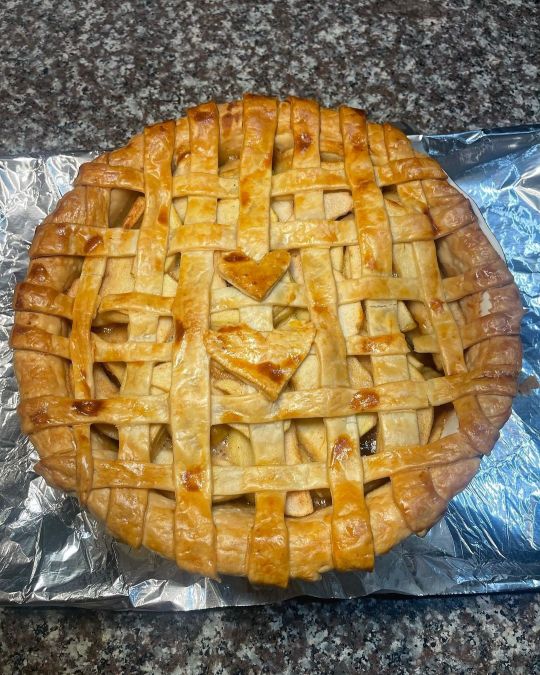
Source
#lexual media#lexual#elexusjionde#elexus jionde#lexual__#interlexual media#alt black girl#alt black people#alt black women#alternative black girl#alternative black women#alt girl#alt aesthetic#alternative#alt fashion#alternative fashion#black goth#goth aesthetic#goth girl#goth#black girl magic#black girl aesthetic#black girl beauty#black girl luxury#black girl moodboard#melanin poppin#black women#black beauty#melanin#black woman beauty
92 notes
·
View notes
Video
youtube
Elexus Jionde does good stuff. Some of it's about current events like this, but the bigger focus a lot of the time is more on how the US got to be the very special kind of mess it is, often with a particular focus on racism/sexism in addition to class, like the series she's been doing about the 70s. I really need to read her book, Angry Black Girl, which I've had a copy of next to my bed for months, but this year has been A Thing, and unfortunately my capacity for that kind of reading is very low and continuing to drop.
1 note
·
View note
Video

329 notes
·
View notes
Text
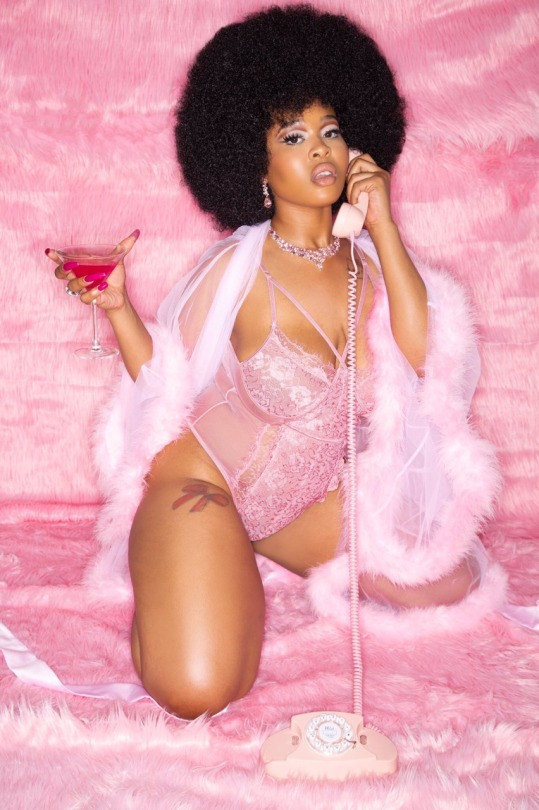
Elexus Jionde ✨
@lexual__ on twitter
#@lexual__ on twitter#black women#black women in pink#pink#color#pretty in pink#baby pink#pink lingerie#black woman#black girl#beauty#pink 😩
40 notes
·
View notes
Link
History of white-poverty-hate. Fuck white supremacy, fuck capitalism.
1 note
·
View note
Photo
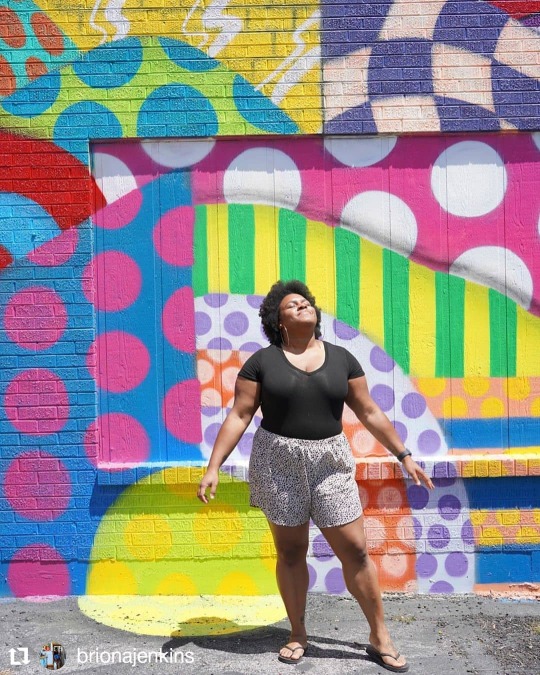
#Repost @brionajenkins • • • • • • Looking for the light in these very dark times. Another day, another moment to remind y’all that Black women are not protected. - The cops who murdered Breonna Taylor aren’t in jail - “The estimated life expectancy of a Black trans woman is only 35 years old.” A quote from a piece by Ashlee Marie Preston - Megan the Stallion was shot and people have turned her traumatic experience into a joke - Tamar Braxton attempted suicide last week and I just heard about it on Wednesday - “in America, approximately 3 women are killed by a spouse, lover, or partner everyday. In recent years, 53% of these women are black. Black women are 4x more likely than their white peers to be murdered by a lover and 7x more likely to be killed when pregnant than white women.” A tweet from elexus jionde - “researchers found that of the 658 women who died of maternal causes in 2018, black women fared the worst, dying 2½ times more often than white women (37.1 vs 14.7 deaths per 100,000 live births)” from NBC News - we are over sexualized and told that our bodies, looks, voices, style, etc is too loud, over the top, ghetto, but then when Non Black women of color and white women steal those same looks and what not they are praised, considered edgy and considered the epitome of beauty - if I hear “you’re so pretty for a Black girl” or “I don’t date Black women” again I will lose it. Essentially being a Black woman is exhausting and I need y’all to start showing up for us the same way you want us to show up for everyone else. https://www.instagram.com/p/CDCKD8vngVK/?igshid=nusggmjmn8q2
0 notes